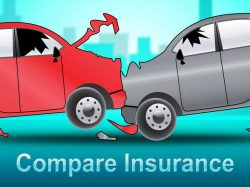Accidents – fender-benders or worse – are unfortunate. The costs can be extreme. Costs include repairing cars, medical bills, lost wages, etc. The question most drivers have in this situation is “whose car insurance should pay?”
Before we answer that question, find out if you’re getting a fair price on your insurance? Use our free car insurance calculator. Just click the button below.
The answer depends on who is at-fault. Drivers found to be at-fault in an accident are responsible for the total cost of damages, which may be covered by collision coverage on their insurance policy. They will also pay for the cost of the deductible.
The party not at-fault, if they make a first-party claim under their own insurance policy, will have to pay the deductible. Their insurance company may subrogate–go after the at-fault person’s insurance company–to recoup the monies they pay out on your claim. They may also get back the cost of your deductible. The exception is if you have broad-form collision, in which case you will not have to pay for the deductible when you are not at-fault in an accident.
If the party not at-fault doesn’t want to go this route, they can make a claim against the other party’s insurance company and not have to pay the deductible.
How is at-fault determined?
Determine fault can get a bit complicated. For the purpose of this post, we’re going to make it really simple. Here are some good guidelines:
- A driver that hits another car from behind is at fault.
- Hitting another car when turning left is likely the fault of the driver turning.
Other scenarios may not be as clear. The best way to determine fault is to get a police report.
How fault is determined is fairly uniform from state to state. How the fault affects who pays the bill can vary somewhat from state to state. Some states require the at-fault driver to pay for vehicle damages based upon a percentage of fault. Other states take an all-or-nothing approach to fault. In that event, the at-fault driver pays the full cost of vehicle damages.
What about no-fault states?
Even in states that with no-fault insurance regulations, accident fault determines who pays for vehicle damages in an accident. No-fault insurance laws only apply to expenses for injuries, physical rehab, and wages lost due to an accident.
What if someone else is driving your vehicle?
Coverage in this case depends on permission. If you give permission to that person to drive your vehicle, your insurance policy will most likely cover damages in an accident. As to who pays the deductible, that’s something to be worked out between you as the vehicle owner and the person you allowed to operate the vehicle.
It is ultimately your responsibility to pay the deductible, whether or not you get it back from the driver.
Quick decision – who to call
If you know you are not at fault in the accident, file a claim with the other driver’s insurance company instead of calling and making a claim on your own policy. But fault is sometimes hard to determine.
The best course of action is to get all the particulars of the other driver’s insurance policy, names, addresses of driver, passengers, any witnesses to the accident. Give your insurance information to the other driver as well. Call the police and have an accident report filed. In some states, even if the damage is minor, failure to notify the police of an accident could get you in trouble. What’s in the police report may have a bearing on the extent to which either driver is held to be at-fault.
What to do Before an Accident
Every driver needs to know how good their insurance is, before they have an accident. After the accident is too late. If the company won’t pay the claim, you’re stuck. The likelihood of this goes up as the dollar amount of the claim becomes larger. I learned this the hard way. When I was hit, while riding a bicycle, by a car turning left (100% at fault), no insurance company would pay the medical bills.
No my mantra is, it doesn’t matter how cheap your insurance is, if the insurance company won’t pay a claim, it was a waste of money.
Find out how good your insurance company is with a free rating from ValChoice. Just click the button below.


No comments yet.